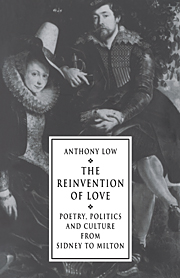Book contents
- Frontmatter
- Contents
- Preface
- Introduction
- 1 Sir Philip Sidney: “huge desyre”
- 2 John Donne: “Defects of lonelinesse”
- 3 John Donne: “the Holy Ghost is amorous in his Metaphors”
- 4 George Herbert: “the best love”
- 5 Richard Crashaw: “love's delicious Fire”
- 6 Thomas Carew: “fresh invention”
- 7 John Milton: “Because wee freely love”
- 8 John Milton: “Haile wedded Love”
- Conclusion
- Notes
- Index
5 - Richard Crashaw: “love's delicious Fire”
Published online by Cambridge University Press: 02 October 2009
- Frontmatter
- Contents
- Preface
- Introduction
- 1 Sir Philip Sidney: “huge desyre”
- 2 John Donne: “Defects of lonelinesse”
- 3 John Donne: “the Holy Ghost is amorous in his Metaphors”
- 4 George Herbert: “the best love”
- 5 Richard Crashaw: “love's delicious Fire”
- 6 Thomas Carew: “fresh invention”
- 7 John Milton: “Because wee freely love”
- 8 John Milton: “Haile wedded Love”
- Conclusion
- Notes
- Index
Summary
Among the most notable marks of the courtly and Petrarchan love traditions is the centrality of the lover's longing or desire. Ordinarily, a Petrarchan lover can never expect to satisfy his all-powerful desire on this side of the grave. In versions of courtly love in which the lover's desire is requited, and he joins with his mistress as Tristan does with Iseult, fate or the lovers themselves usually manage to produce further obstacles to their happy union. In the Petrarchan tradition of the English Renaissance, frustration and unsatisfied desire are the almost universal story. It has even been suggested, on reasonable grounds, that a haughty mistress is, as we would now say, unconsciously necessary to such a Petrarchan lover, because only her refusal can empower him to indulge his longing to the full. As Denis de Rougement and Mario Praz among others have suggested, these lovers typically seek to be thwarted or otherwise disappointed; they are in love with desire itself, not with fulfillment. Indeed, although a Petrarchan lover, like his Romantic descendants, may say otherwise, often in the depths of his psyche he really seeks frustration, disappointment, destruction of himself and others, and ultimately death.
Richard Crashaw has no reputation as a writer of secular love lyrics. Few of his poems in this vein can stand beside his devotional poetry. Yet all of his love poems and translations share a surprising characteristic: a near absence of raw desire.
- Type
- Chapter
- Information
- The Reinvention of LovePoetry, Politics and Culture from Sidney to Milton, pp. 108 - 131Publisher: Cambridge University PressPrint publication year: 1993



